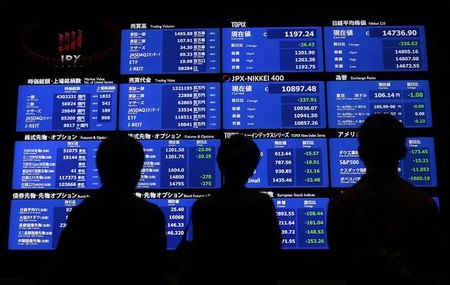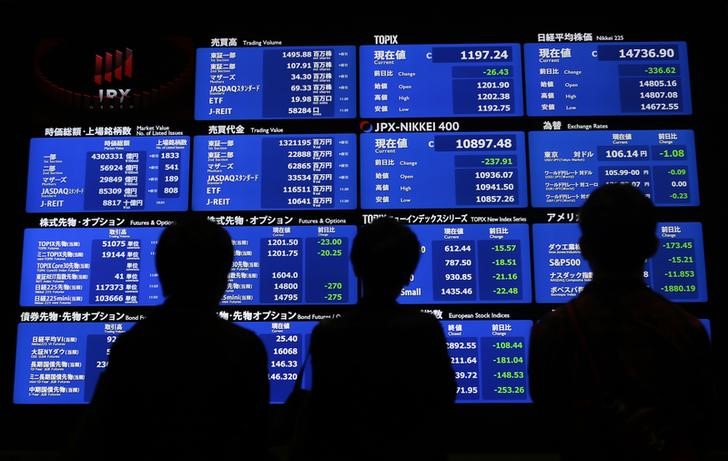By Lisa Twaronite
TOKYO (Reuters) - Japanese stocks soared 4.8 percent to their highest close since November 2007 and the yen skidded to near seven-year lows against the dollar on Friday, after the Bank of Japan surprised markets with fresh easing steps it called a pre-emptive move to stoke inflation.
The Nikkei stock average (N225) marked its biggest one-day gain since June 2013 after Japan's central bank said it would purchase more shares of exchange-traded funds and real estate investment trusts, extend the duration of its portfolio of Japanese government bonds, and increase the pace at which it expands base money to "pre-empt manifestation" of risks.
The buoyant mood was likely to carry over to Europe, where financial spreadbetters expected Britain's FTSE 100 (FTSE) to open 54 points higher, or up 0.8 percent; Germany's DAX (GDAXI) to open 95 points higher, or up 1 percent; and France's CAC 40 (FCHI) to open 43 points higher, or up 1 percent.
S&P e-mini futures
The dollar was buying 111.06
"It was a total surprise that the BOJ eased further at this time given that BOJ executives have not voiced such pessimistic views lately. The move was apparently made in response to underlying weakness in prices," said Junko Nishioka, chief economist at RBS Securities Japan.
"I think the move will be effective as it prompted a sharp drop in the yen. That will help boost import prices, which will in turn help bring inflation closer to the BOJ's target," she said.
After the Nikkei closed, the BOJ released its latest semiannual outlook and slashed in half its economic forecast for the current fiscal year to 0.5 percent, after demand weakened in the wake of a sales tax hike in April.
BOJ Governor Haruhiko Kuroda told reporters on Friday that there was still room for further easing if needed, but the central bank believed Friday's steps were sufficient.
Data released early on Friday showed Japan's annual core consumer inflation slowed for a second straight month in September, adding to evidence the BOJ is likely to miss its price goal.
Before the BOJ's surprise, markets were cheered by Wall Street's surge late in Thursday's session after news of surprisingly strong third-quarter U.S. economic growth as the trade gap narrowed. But domestic demand slipped, hinting at some loss of momentum.
The data came a day after the U.S. Federal Reserve surprised markets with an optimistic assessment of the U.S. economy when it announced the end of its monthly bond buying stimulus programme.
Japan's outperformance boosted shares outside of Japan, with MSCI's broadest index of Asia-Pacific shares outside Japan (MIAPJ0000PUS) adding 0.8 percent, putting it on track for weekly and monthly gains of more than 2.5 percent.
Japanese shares also got a lift from news that Japan's Government Pension Investment Fund is poised to approve allocation targets which aim to raise the portion of Japanese shares in its portfolio to 25 percent from the current target of 12 percent, two government sources said.
"The consensus was that GPIF would go to 20 percent Japanese stocks. The impact of 25 percent will be strong, with a positive impact for stocks," said Masayuki Doshida, senior market analyst at Rakuten Securities in Tokyo.
But data released before the market open showed Japan's jobless rate rose in September and the availability of jobs fell for the first time in more than three years, suggesting the labour market is starting to lose some momentum. Japanese household spending also fell more than expected in September.
Popular cross-trades, involving purchases of higher yielding currencies against the yen, soared after the BOJ easing, with Australian dollar (AUDJPY=R) rising 1.5 percent and the New Zealand dollar (NZDJPY=) gaining 1.6 percent against the yen.
The euro dropped 0.3 percent to $1.2574
In commodities trading, spot gold
Brent crude
(Additional reporting by Tetsushi Kajimoto, Thomas Wilson in Tokyo and Vidya Ranganathan in Singapore; Editing by Shri Navaratnam and Eric Meijer) Visitors look at a st
By Lisa Twaronite
TOKYO (Reuters) - Japanese stocks soared 4.8 percent to their highest close since November 2007 and the yen skidded to near seven-year lows against the dollar on Friday, after the Bank of Japan surprised markets with fresh easing steps it called a pre-emptive move to stoke inflation.
The Nikkei stock average (N225) marked its biggest one-day gain since June 2013 after Japan's central bank said it would purchase more shares of exchange-traded funds and real estate investment trusts, extend the duration of its portfolio of Japanese government bonds, and increase the pace at which it expands base money to "pre-empt manifestation" of risks.
The buoyant mood was likely to carry over to Europe, where financial spreadbetters expected Britain's FTSE 100 (FTSE) to open 54 points higher, or up 0.8 percent; Germany's DAX (GDAXI) to open 95 points higher, or up 1 percent; and France's CAC 40 (FCHI) to open 43 points higher, or up 1 percent.
S&P e-mini futures
The dollar was buying 111.06
"It was a total surprise that the BOJ eased further at this time given that BOJ executives have not voiced such pessimistic views lately. The move was apparently made in response to underlying weakness in prices," said Junko Nishioka, chief economist at RBS Securities Japan.
"I think the move will be effective as it prompted a sharp drop in the yen. That will help boost import prices, which will in turn help bring inflation closer to the BOJ's target," she said.
After the Nikkei closed, the BOJ released its latest semiannual outlook and slashed in half its economic forecast for the current fiscal year to 0.5 percent, after demand weakened in the wake of a sales tax hike in April.
BOJ Governor Haruhiko Kuroda told reporters on Friday that there was still room for further easing if needed, but the central bank believed Friday's steps were sufficient.
Data released early on Friday showed Japan's annual core consumer inflation slowed for a second straight month in September, adding to evidence the BOJ is likely to miss its price goal.
Before the BOJ's surprise, markets were cheered by Wall Street's surge late in Thursday's session after news of surprisingly strong third-quarter U.S. economic growth as the trade gap narrowed. But domestic demand slipped, hinting at some loss of momentum.
The data came a day after the U.S. Federal Reserve surprised markets with an optimistic assessment of the U.S. economy when it announced the end of its monthly bond buying stimulus programme.
Japan's outperformance boosted shares outside of Japan, with MSCI's broadest index of Asia-Pacific shares outside Japan (MIAPJ0000PUS) adding 0.8 percent, putting it on track for weekly and monthly gains of more than 2.5 percent.
Japanese shares also got a lift from news that Japan's Government Pension Investment Fund is poised to approve allocation targets which aim to raise the portion of Japanese shares in its portfolio to 25 percent from the current target of 12 percent, two government sources said.
"The consensus was that GPIF would go to 20 percent Japanese stocks. The impact of 25 percent will be strong, with a positive impact for stocks," said Masayuki Doshida, senior market analyst at Rakuten Securities in Tokyo.
But data released before the market open showed Japan's jobless rate rose in September and the availability of jobs fell for the first time in more than three years, suggesting the labour market is starting to lose some momentum. Japanese household spending also fell more than expected in September.
Popular cross-trades, involving purchases of higher yielding currencies against the yen, soared after the BOJ easing, with Australian dollar (AUDJPY=R) rising 1.5 percent and the New Zealand dollar (NZDJPY=) gaining 1.6 percent against the yen.
The euro dropped 0.3 percent to $1.2574
In commodities trading, spot gold

Brent crude
(Additional reporting by Tetsushi Kajimoto, Thomas Wilson in Tokyo and Vidya Ranganathan in Singapore; Editing by Shri Navaratnam and Eric Meijer)
